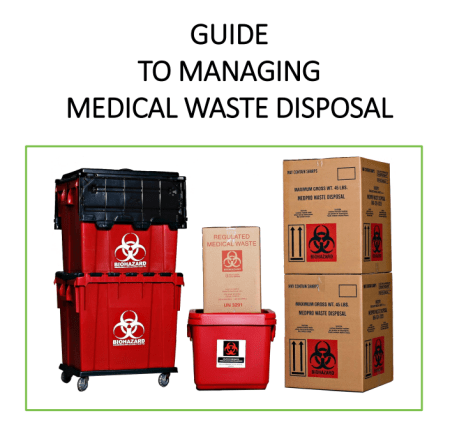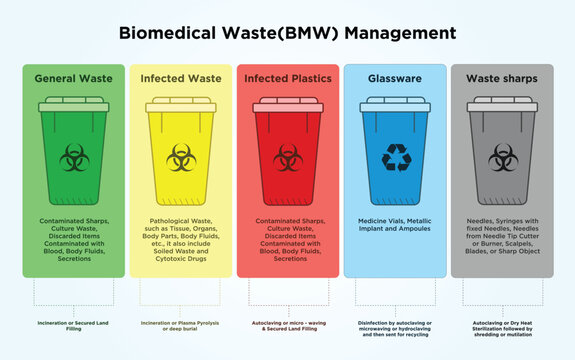Specialist Medical Waste Disposal Services: Handling Biohazards
Specialist Medical Waste Disposal Services: Handling Biohazards
Blog Article
Navigating Medical Waste Disposal: Crucial Solutions for Healthcare Facilities
In the detailed landscape of medical care operations, the administration of clinical waste is a vital facet that requires meticulous interest. Health care centers, whether large hospitals or small centers, are turned over with the obligation of handling, dealing with, and disposing of a wide variety of medical waste streams. The complexities included in browsing with the governing needs, making certain appropriate waste segregation, and implementing risk-free collection and transport processes are vital. Understanding the necessary services that sustain medical waste disposal is not just an issue of compliance however likewise a basic component in safeguarding public health and ecological well-being. The intricacies of this process are essential for health care facilities, and the experience supplied in this world plays an essential duty in maintaining the stability of medical care systems.
Regulatory Compliance Assistance
For healthcare facilities, ensuring regulative conformity support is important to preserve appropriate handling and disposal of clinical waste. Abiding by regulations stated by organizations such as the Epa (EPA) and the Occupational Security and Health Administration (OSHA) is crucial to stop environmental contamination, shield public health, and prevent potential lawful consequences. Regulatory compliance support supplies medical care facilities with support on how to appropriately segregate, shop, transportation, and get rid of various kinds of medical waste in accordance with local, state, and federal laws. This support consists of aid in developing and applying extensive waste administration plans, performing regular staff training sessions, and executing audits to ensure ongoing conformity. By partnering with regulatory conformity experts, healthcare centers can stay updated on advancing laws, reduce risks associated with incorrect garbage disposal, and eventually add to a more secure and much more lasting environment for all.
Waste Segregation Guidance

Health care centers must offer clear standards and training to personnel on how to segregate waste efficiently. This consists of separating general waste from harmful products such as sharps, contagious waste, drugs, and chemical waste. Color-coded containers, tags, and signage are typically utilized to assist in waste segregation practices. Regular audits and monitoring of waste segregation processes are essential to recognize any problems and make required improvements.
Collection and Transport Solutions

Appropriate collection and transportation services are essential elements of the clinical waste disposal procedure in health care centers. These services guarantee that hazardous products are dealt with safely and in conformity with guidelines to protect both the environment and public health and wellness. Health care centers count on specialized waste monitoring firms to provide efficient collection and transportation services customized to their requirements.
Medical waste collection entails setting apart different types of waste at the factor of generation, making use of color-coded bags or bins to differentiate between basic, dangerous, pharmaceutical, and other waste streams. Educated workers should do this job to stop contamination and ensure proper disposal. Once accumulated, the waste is moved in dedicated automobiles outfitted to take care of hazardous materials safely. These vehicles comply with rigorous safety standards and comply with designated courses to certified treatment centers for disposal with approaches such as landfilling, sanitation, or incineration.
Therapy and Disposal Solutions
In the realm of medical waste disposal for health care centers, after the vital stage of collection and transport solutions, the focus moves in the direction of carrying out reliable therapy and disposal solutions. Therapy options commonly include processes such as autoclaving, which utilizes vapor under pressure to sterilize the waste. This method is generally utilized for transmittable waste that needs to be rendered non-hazardous prior to disposal. Another common therapy method is incineration, where waste goes through heats in regulated settings to lower its volume and remove virus.
Disposal remedies encompass the last action in the medical waste management process. Facilities might decide for land fill disposal, where dealt with waste is very carefully deposited in marked areas. Medical Waste Disposal Services. Alternatively, health care centers can choose to make use of waste-to-energy centers, which incinerate waste to generate electrical energy. Recycling and resource healing are also acquiring traction as lasting disposal choices for sure kinds of clinical waste products.
Effective therapy and disposal options are vital in ensuring compliance with policies and securing public health and wellness and the environment. Health care centers must carefully assess and pick suitable techniques that line up Continued with their waste monitoring goals and sustainability campaigns.
Staff Training and Education And Learning

To properly manage medical waste disposal in health care facilities, extensive personnel training and education and learning play a crucial role in guaranteeing adherence to regulatory demands and preserving a risk-free environment. Correct training equips staff with the knowledge and skills required to deal with different kinds of medical waste, hop over to these guys segregate them appropriately, and package them safely for disposal. By informing workers on the risks related to improper handling of clinical waste, facilities can reduce the likelihood of crashes, contamination, and regulative infractions.

Verdict
Finally, healthcare centers depend on necessary medical waste disposal services to guarantee regulatory compliance, correct waste partition, safe collection and transportation, efficient treatment and disposal, along with team training and education and learning. These services play an important function in keeping the health and wellness of both medical care employees and the public, highlighting the value of proper monitoring of medical waste in health care setups.
For medical care facilities, ensuring regulative compliance assistance is important to keep proper handling and disposal of clinical waste. Waste partition involves classifying different kinds of medical waste to guarantee proper handling, treatment, and disposal. This includes separating informative post general waste from hazardous materials such as sharps, contagious waste, drugs, and chemical waste.Clinical waste collection includes setting apart various types of waste at the factor of generation, utilizing color-coded bags or containers to distinguish in between general, dangerous, pharmaceutical, and other waste streams.In the world of clinical waste disposal for medical care centers, after the critical phase of collection and transportation services, the focus changes in the direction of applying effective treatment and disposal options.
Report this page